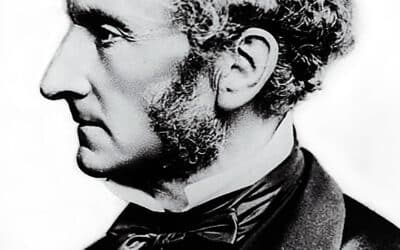One of the strangest developments in the recent history of Western democratic states has been the heartfelt call by duly elected officials for government censorship of citizens’ speech. This trend has emerged simultaneously across various nations, including the United Kingdom, Australia, and, oddly enough, the United States of America. No one is surprised that tyrants throughout history, who seize power by force, have retained their positions primarily through silencing dissenters and political opponents. The very foundation of democratic states, however, is what the nineteenth-century British philosopher John Stuart Mill, a great champion of liberty, called “the marketplace of ideas.”
In a public square conducive to open discourse among free people, individuals with diverse interests and opinions hash out ideas and prospective policies in order to determine which ones should prevail. In effect, this competition among ideas reflects the very process used to elect government officials in democratic states. The candidates are permitted to express their views and what they plan to do, and the voters then choose between the available options, however dismal, at the voting booth.
Just as candidates who do not stand to represent and promote the interests of the people are to be defeated through the electoral process itself, in a free marketplace of ideas, bad ideas and flagrant falsehoods will eventually be rejected. This takes longer in some cases than others, above all, when powerful lobbies have significant financial interests at stake, a salient example of which is war and what has become a military-industrial-congressional-media-academic-pharmaceutical-logistics-banking complex. But at some point, eventually, free thinkers come to believe that the policies of their government, which they formerly condoned, are in fact misguided, counter-productive, and even immoral. When many people change their view, concluding that practices such as slavery, or withholding the right to vote from women, have no rational basis whatsoever, then they press their representatives to alter the laws of the land.
What makes it curious that self-proclaimed democratic leaders should champion policies of government censorship is the simple fact that wrongheaded institutions, including slavery, would never have been abolished, had dissenters from the government’s laws not been permitted to speak. Slavery was considered perfectly normal—the way of the world—and was legal according to the letter of the law in many places for millennia. For most of human history, abolitionists were in the strict minority, but ultimately they converted majority populations to agree with them. They did this through the use of speech.
In extreme cases of obviously wrongheaded or even evil governments, such as that of Nazi Germany, the laws of the land were abhorrent, but this fact was not recognized by most citizens at the time. The reason why the Nazis succeeded to the extent to which they did was precisely because the range of acceptable discourse was determined by the very officials who devised and championed what are now acknowledged, by people everywhere, including Germans, to have been despicable laws. There were, of course, individuals who dissented from the reigning narrative in the 1930s and 1940s, but when identified, such persons were treated as criminals by those in power. Throughout history, so-called troublemakers have often been executed for daring to defy the state, just as happened in Germany under Adolf Hitler.
Pseudo-democratic governments coerce the citizenry through the deft use of deception, including the discreditation and harsh denunciation of anyone who dares to dissent. But less obviously heinous laws than those of the Third Reich are also abandoned or altered when enough of the populace comes to sympathize with the activists agitating for change. In all such cases, in order for the naysayers to change anyone’s view, they must be permitted to speak. How else could the people be persuaded that there was anything awry? A recent example of a radical change in the law, with tangible consequences for millions of U.S. citizens, would be the legalization of the possession of marijuana, once codified by state governments as a crime worthy of imprisonment.
Now, there has always been government control of wartime narratives, said to be necessitated by national defense, or the safeguarding of democracy itself. During wartime, people who speak out in defiance of the government are typically denigrated as enemy sympathizers, if not traitors. Preposterously enough, profoundly undemocratic policies, such as the conscription of young men to don uniforms and fight against their will for causes which they do not regard as worthy of the sacrifice of their life, are sometimes championed by the leaders of otherwise democratic states during wartime. This self-contradiction arises because the government portrays every military conflict in which it engages as exceptional in the sense that the very existence of the state is allegedly at issue. The urgency and peril of the situation are claimed to necessitate extraordinary measures, above all, the restriction of citizens’ liberty in exchange for security.
The instances in which U.S. government officials have flat-out lied to their citizenry in efforts to generate and buoy support for military missions abroad are too numerous to list. Notoriously, the Pentagon Papers revealed that elected leaders and their appointees knowingly and repeatedly misled the populace in order to be able to prolong and expand the otiose military mission in Vietnam. Support for the 1991 Gulf War on Iraq, too, was generated in part by the dissemination of false narratives such as that Saddam Hussein’s henchmen were ripping babies from incubators in Kuwait.
Claims of “existential threats” are nearly always gross exaggerations, but they work wonders rhetorically to quell dissent and elicit support even for conflicts as dubious as was the 2003 invasion of Iraq. The massive military mission set in motion by the administration of President George W. Bush was rationalized by appeal to a number of manifest falsehoods, most notably, that Saddam Hussein was in cahoots with al Qaeda, and Iraq had rehydrated its programs for the production of weapons of mass destruction (WMD). The “evidence” for the former assertion derived from the testimony of a tortured prisoner who eventually guessed what his interrogators wanted him to say and then said it, obviously so that they would cease torturing him. At the United Nations General Assembly, Secretary of State Colin Powell presented what was said at the time to be a “slam-dunk” case for the existence of active WMD programs: that Iraq had purchased “yellow cake” in Niger and metal test tubes for centrifuges used only for the enrichment of uranium, in addition to images of vehicles identified as mobile chemical laboratories. All of the so-called evidence was ersatz, but it served the government’s purpose of galvanizing support for the invasion. Decades later, there still appear to be citizens who have no idea that Saddam Hussein had nothing to do with the terrorist attacks of September 11, 2001.
Similar wartime censorship ploys were successfully implemented throughout the Coronapocalypse. They were successful in the sense that persons’ own determinations of how to act were decisively influenced by the government’s insistence that all good, law-abiding people should be willing to do whatever their leaders told them to do—even when those directives conflicted with citizens’ independent determinations about what would be in their best interests. Widespread shaming campaigns featuring politicians and celebrities alike were used to forge a coalition of citizens willing to denounce and ostracize family members, co-workers and (former) friends who refused to “do the right thing.” Even as their liberties were sharply curtailed, many citizens complied with government measures, reasoning thus: “Better to err to the side of caution, and who, after all, would really be harmed by wearing a mask or taking a vaccine certified by the government as safe and effective?”
The pandemic context was different in some ways from the typical wartime situation, but the rationalization for censorship was, in essentials, the same: people needed to be protected from the speech of those who would dissent from the official government narrative because, according to “the experts,” that was the only way to keep everyone safe. Rather than “the evil enemy” comprising adversarial leaders and their soldiers, from 2020 to 2023, “the evil enemy” became a nonhuman virus. The persons harshly denounced for refusing to believe and act as they were told to do by authorities and their parrots in the pharmaceutical industry-infiltrated mainstream media were cast as force multipliers of COVID-19.
The U.S. government also exerted pressure on ostensibly independent social media platforms to suppress dissenting voices—for example, those who questioned the efficacy of wearing masks made of materials with pores larger than the virus particles responsible for the spread of COVID-19—who were denounced as purveyors of disinformation. As some of the dissenters pointed out, a variety of peer-reviewed scientific studies had demonstrated what followed in any case mathematically: that airborne diseases cannot be controlled through the use of porous masks. Strikingly, social media platforms were pressured by the government to suppress factual reports of vaccine injury, on the grounds that they constituted “malinformation,” which, despite being true, would end up harming more people than they would help.
Of particular note during this bizarre period of history was the ridicule of people who “did their own research” rather than act solely on faith that figures such as public health guru Dr. Anthony Fauci had unique access to the truth and were sincerely trying to protect them. Those who dared to suggest possible financial incentives among key players in forging the COVID-19 narrative—such as Bill Gates and Pfizer CEO Albert Bourla—for maintaining a level of fear among the citizenry until every person on the planet was vaccinated were ridiculed and spurned as dangerous, even evil, “conspiracy theorists.”
In reality, calls for censorship in the name of the well being of the persons supposedly being protected by the state is always and everywhere a grand act of deception and, therefore, an assault on democracy. No one is protected from anything by being shielded from the speech of anyone else. On examination, such calls for censorship are thinly veiled ploys to secure agreement with “the official story” and compliance with the policies being imposed. When rational persons refused to roll up their sleeves and participate in the largest experimental trial of a novel medical device in history—the mRNA shots—they were denounced by government officials the world over as enemies of good people everywhere. This despite the fact that Pfizer, whose products were being aggressively marketed by governments themselves, had paid the largest fine for healthcare fraud in the history of the world.
When people who had recovered from COVID-19 declined to take the mRNA shots, given that they had already produced the antibodies needed to rid their body of the virus—as evidenced by the fact that they were no longer ill (and certainly not dead), some governments demanded nonetheless that they comply, on pain of punishment for refusal to do so. In the end, the people viciously denounced as spreaders of “misinformation” were right, and the government censors, however well-intentioned some of them may have been, were clearly ignorant of the mechanism by which the magical “vaccines” acted to impel the production of the virus spike protein, and thus provoke an immune response to the pseudo-foreign “invader” produced by the body itself. Far from demonstrating their moral superiority, the government censors and parrot pundit class revealed only their scientific illiteracy.
The pro-censorship trend currently on display in the United States, the United Kingdom, Australia, and beyond, appears to be something of an aftershock of the Coronapocalypse, during which governments imposed a wide range of laws and measures restricting the liberty of citizens, allegedly on their behalf. Notwithstanding the numerous demonstrable falsehoods purveyed by the government throughout recent history, many citizens continue charitably to interpret the official calls for censorship in response to the virus as having been imposed with the best of intentions.
The results of the recent U.S. presidential election are encouraging in that the Democratic presidential and vice presidential nominees, Kamala Harris and Tim Walz, both of whom support initiatives such as the establishment of an Orwellian Disinformation Governance Board, were soundly defeated. There is a second, more fundamental, sense in which the outcome represented a victory for democracy: in 2024, the Democratic presidential nominee was not chosen by the people themselves through a rigorous primary process, during which candidates are typically tested through extensive interviews and debates affording voters the opportunity to evaluate a range of detailed policy plans and competing visions for the country. Kamala Harris was appointed by a small committee of party elites, despite having dropped out early during the Democratic presidential primary in 2020, due in large part to lack of popular support. When Harris was foisted upon voters as the party’s nominee in 2024, they resoundingly rejected her candidacy in the general election.
Ironically, Donald Trump’s opponents portrayed him as a Hitlerian strongman, when in fact he campaigned on a platform of prosperity and liberty, commencing with a guarantee of citizens’ right to free speech. Trapped in a fantasy woven by themselves, Democratic party elites have somehow failed to appreciate that censorship was in fact the secret to Hitler’s success. If a falsehood is repeated frequently and vigorously enough, then, as we have seen, some people will come to embrace it, perhaps even religiously. But so long as free people are permitted to dissent from what they perceive to be bad ideas and policies, then the specter of a new Third Reich can be fended off.
To permit the government to determine what citizens may read, say, and believe, would in fact be the swiftest path to outright tyranny in the United States. For now, that danger has been averted, most likely due to the coalition of free thinkers who came together to support Trump despite their many disagreements with him on specific issues and policies. What all of the motley crew of intellectuals supporting Trump agree on is this: free speech is itself non-negotiable, if the United States is to remain anything approximating a functional democratic republic.
That politicians are no more than citizens who were elected to office by their fellow citizens should suffice to illustrate that they have no specific expertise beyond their ability to win election campaigns. But somehow the Democratic party lost its way, coming to believe in the superior intellect and vision of elite party members, as though they were a select group of philosopher kings. In reality, in a democracy, every elected official has been appointed by the very people claimed by the would-be censors to be incapable of judging for themselves whether a text is true or not. But if citizens cannot distinguish misinformation or disinformation from knowledge and truth, then how is it that they are supposed to be qualified to select their leaders in the first place?
This contradiction, what might be termed “the appointment of experts by ignoramuses paradox,” is obviously not recognized by anyone who insists that democratic governments must protect people from the words of other people. All human beings are fallible, and there is no reason for believing that upon election to a political office a person is magically endowed with wisdom and perspicacity. On the contrary, given the privilege and wealth which elected officials often come to enjoy, especially in recent times, we should perhaps regard their own opinions even more critically than those of fellow citizens who do not stand to benefit personally from the policies being championed by silver-tongued supporters of censorship.








